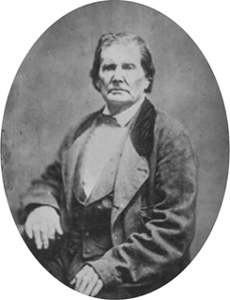
WHISKEY TRADER
1778–1851
![]()
Shiloh Cemetery, Pleasant Grove Township, Illinois
Born in Virginia, Thomas Lincoln moved west with his father into Kentucky to a remote plot of frontier land at the suggestion of a distant relative, the pioneer Daniel Boone. At age eight, while he and his two older brothers were planting in a field a good distance from their house, they witnessed their father’s attack and murder by an Indian. His older brother, Mordecai, shot the Indian dead with a rifle moments later. His mother, Bathsheba, moved the family again to Nelson County, Kentucky.
Generally unambitious and incompetent, Lincoln rarely found paying jobs in Kentucky, though he was known as a decent carpenter. He married in 1806 and, after a decade of hard luck, endeavored to move north to Indiana, where land was reportedly inexpensive and fertile. When the time came, he traded his worldly goods for whiskey barrels he hoped would serve as the currency for a new life. His two young sons attended the casting off of the boat from the Rolling Fork River into the Ohio, but the boat capsized in an eddy, sending several barrels and a set of tools into the river. Some barrels were recovered, as were the tools, and Lincoln found an oxcart to bring them to the new land where he eventually settled.
One of his sons, young Abraham, would never be much of a drinker, perhaps because he witnessed much of the family fortune floating down the river. In 1862, acting in his capacity as sixteenth president of the United States, he passed into law an emergency wartime revenue act, taxing sinful and luxurious goods such as tobacco, playing cards, pianos, yachts, feathers, and distilled spirits, thus creating in the United States the concept of the illicit distiller, or moonshiner. Lincoln’s excise tax, though designed as a stopgap measure to raise funds for the Union, remains to this day, and helped fund expansion of the federal government after the Civil War, until the income tax passed in 1913.
Thomas Lincoln and his son stopped speaking in later years. They disagreed over the virtue of religion and education. The younger Lincoln did not attend his father’s funeral and would not pay for a headstone.